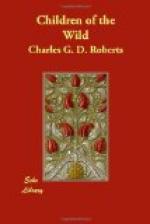“My, but that eagle must have felt awfully ashamed!” exclaimed the Babe.
“The next day,” continued Uncle Andy, without noticing the interruption, “the two old crows began to think it would soon be time to teach this independent pair of youngsters to fly. And they thought, too, that they’d be able to manage it all by themselves, without any help or advice from the rest of the flock. While they were thinking about it, in the next tree, for they were not a great pair to stay at home, you know, one of the youngsters, the female, gave an impatient squawk, spread her wings, and fell off her branch. She thought it was flying, you know, but at first she just fell, flapping her wings wildly. In two seconds, however, she seemed to get the hang of it, more or less. With a violent effort, she rose, gained the next tree, alighted, panting, beside her parents and looked at them with a superior air, as if she thought that they could never have accomplished such a thing at her age. That was perhaps true, of course, but it was not for her to think so.”
“Huh! I should think not, indeed!” agreed the Babe severely.
“Well,” continued Uncle Andy, now quite absorbed in his narrative, “the other youngster, not to be outdone, went hopping up in great excitement from branch to branch, till he was some ten feet above the rest of the family. Then, launching himself boldly, he went fluttering down to them with no difficulty at all. He was less impetuous and more sagacious than his sister.
“After this the parents continued to feed their independent offspring for a number of days, just because they had been accustomed to feed their nestling for a certain length of time, till at last the youngsters started off to forage on their own account, and the family, as a family, broke up. From habit, however, or from good will, the youngsters kept coming back to roost on the branches beside the nest, and remained on the most friendly, though easy-going, relations with their father and mother.
“In every crow flock, large or small, there seems to be some kind of discipline, some kind of obedience to the wise old leaders of the flock. But the two black imps of Pine-Top were apparently, for the time at least, exempted from it. They did about as they liked and were a nuisance to everybody but their two selves, whom they admired immensely. Being too young for the old crows to take seriously, their pranks were tolerated, or they would soon have been pecked and beaten into better manners. Too big and too grown-up for the young crows—whom they visited in their nests and tormented till driven away by the indignant parents—they had no associates but each other. So they followed their own whims; and the flock was philosophically indifferent as to what might happen to them.




